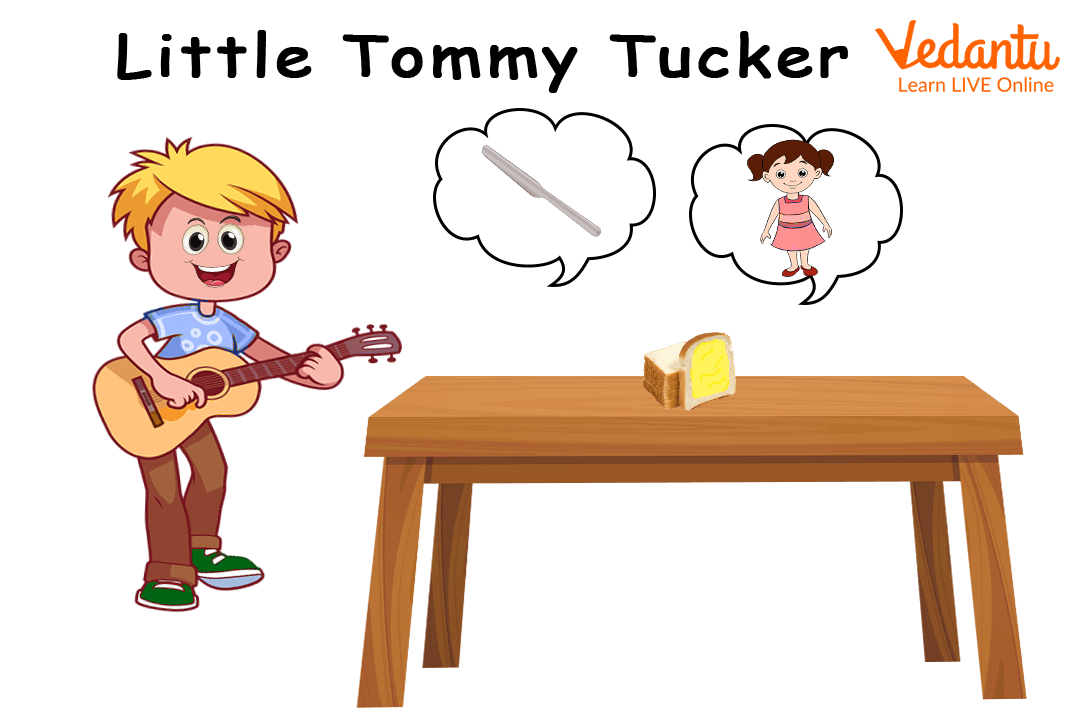A Popular Nursery Rhyme: Little Tommy Tucker
‘Jack and Jill’, ‘Humpty Dumpty’, ‘Baa Baa Black Sheep’, and many other nursery rhymes constitute a significant part of our childhood. Have you ever wondered why rhymes are introduced to pre-schoolers even before they are adept at alphabets? Well, the essence of fun nursery rhymes lies in the rhythm of the language they have. Little Tommy Tucker is a similar nursery rhyme that has a fun rhyming effect. It is often sung to kids even before kindergarten as it finds a way to the list of favourites of most kids.
So let us read a little about how the nursery rhyme Little Tommy Tucker came into use so often for kids before we go to the rhyme.
History of Little Tommy Tucker
The nursery rhyme of Little Tommy Tucker was not always the same; in fact, it did not comprise all the 8 lines at first. The oldest version of this rhyme is found in the ‘Tommy Thumb’s Pretty Song Book’, published in the year 1744, in London. Some other rhymes for children were also published in the songbook.
The version of Little Tommy Tucker, published in 1744, comprises the first four lines of the current version of the rhyme. The revised version of this rhyme comprising all the eight lines was recorded in ‘Mother Goose’s Melody’. This version was published in the year 1765. An English composer, Peter Warlock, had included the current version of Little Tommy Tucker, in his ‘Candlelight: A cycle of nursery jingles’, as the fifth piece.
Though there had been various references to this nursery rhyme, it was formally included in the children’s musical education project by Carl Orff and Gunild Keetman. Once Little Tommy Tucker was counted in the nursery repertoire, it was often included in various collections of such lore. Later, tunes to sing it as a nursery rhyme were incorporated.
The Little Tommy Tucker
Little Tommy Tucker
Sings for his supper.
What shall we give him?
Brown bread and butter.
How shall he cut it
Without a knife?
How will he be married
Without a wife?

Image of Little Tommy Tucker
Little Tommy Tucker is a collection of rhyming verses that introduce a few ideas new to a young child. If we date back to the time when this nursery rhyme was recorded for the first time, we can say that it was a proverbial phrase to sing for one’s supper. The term supper refers to dinner; however, in Scottish English traditions, it refers to an informal delicious evening meal, especially some food served with chips.
In this nursery rhyme, Little Tommy Tucker, a little child Tommy sings for his supper. The poet asks if he should be given brown bread and butter to eat. In the next line, the concept that bread has to be cut with a knife is introduced to kids. It goes as to how little Tommy would cut his bread without a knife. The next line ends with ‘wife’, to rhyme with ‘knife’. It brings in the idea that in order to marry, a man needs a wife.
A Few Words for Parents!
As children have a very low attention span, it is important to make use of interesting techniques when it comes to preschool education. The simple rhyming words happen to make quite an impact in the young minds of children. In fact, they learn faster when taught through rhymes. When children listen to rhyming poems or songs, it retains their attention span till it is interesting to them. So when you sing the rhyme Little Tommy Tucker, try to bring in some actions and facial expressions that may help your child to relate to the lyrics. Modulate your voice especially at the rhyming words to make them more appealing to your child. Also, you may sing Little Tommy Tucker when you serve your child some bread and butter. Let your child explore the space of imagination and check if your child asks for a knife and uses it to cut his bread. Improvising similar ideas to introduce the other nursery rhymes to children will ensure they enjoy the very first steps of education.


FAQs on Little Tommy Tucker
1. What was the first version of Little Tommy Tucker?
The first version of Little Tommy Tucker was not the same as that of the version presently in use. It was as given below:
Little Tommy Tucker
Sings for his supper.
What shall we give him?
Brown bread and butter.
There was another version of this nursery rhyme that was published in 1899. It was slightly different and it read as:
Little Tommy Tupper,
Waiting for his supper,
What must he have?
Some brown bread and butter.
2. What are the five most popular nursery rhymes?
The five most popular nursery rhymes are as follows:
Twinkle Twinkle Little Star
Humpty Dumpty
Row Row Row Your Boat
Baa Baa Black Sheep
Old Mac Donald Had a Farm





